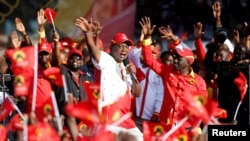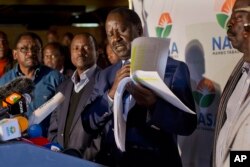Nairobi roads have returned to their usual pre-election bustle and Kenyans have gone back to work.
But the elections are not quite over, as opposition leader Raila Odinga insists the presidential poll was "stolen" and has announced plans to challenge the outcome at the Supreme Court.
Official results show President Uhuru Kenyatta defeated Odinga, 54 percent to 45 percent.
University of Warwick professor of comparative politics, Gabrielle Lynch, says most people expected a tighter presidential race, although she notes the final result is still in dispute.
Lynch also notes the ruling Jubilee party succeeded in gaining parliamentary seats and winning 28 of 47 governorships. She says a projected wave of independent winners failed to materialize.
"Due to alleged problems with party nominations, both in the opposition and Jubilee, in a number of constituencies and counties across the country, independent candidates stood against party candidates, and there was a prediction that quite a few of these people might win. Actually, very few independents won in the end," Lynch said.
Kenya's treasury says the government allocated $483 million for the election, with $415 million directed to the electoral commission, known as the IEBC.
Kenyan researcher Nanjala Nyabola says despite these large sums, there were problems with the voter registry and the transmission of vote counts, and a delay in the release of polling station tally forms.
"We were promised a digital election," Nyabola said. "We didn't have a digital election. The only thing that was digital was the voter registration. Everything else was 100 percent manual. So, it makes you wonder, what did we spend all this money on?"
One week before the election, the electoral commission's head of IT systems, Chris Msando, was found tortured and murdered. Scheaffer Okore, a program officer at political engagement organization Siasa Place, says the lack of follow-up is concerning.
"Investigations, I don't think they're being done, or if they are, I don't know who's doing it," Okore said. "No one wants to answer why this man was killed or murdered, and allegations have come across that he held such as senior position in regards to the process that was supposed to be conducted, and we don't have answers, why was he killed?"
In addition, police killed at least 28 people in post-election violence, including a young girl and a baby, according to Kenya's National Commission on Human Rights. Kenya's Independent Police Oversight Authority says they are investigating these cases.





